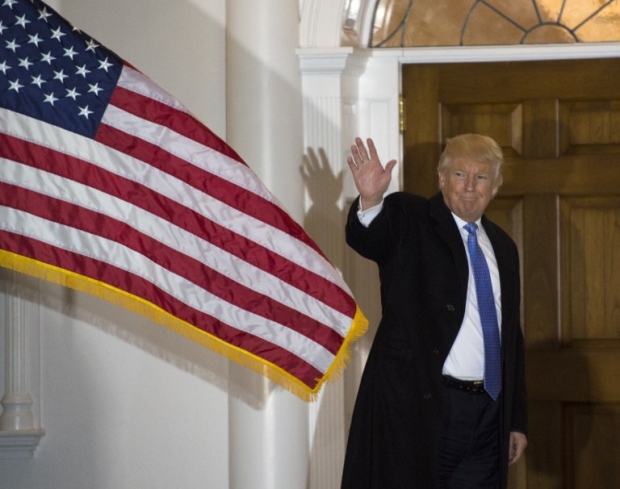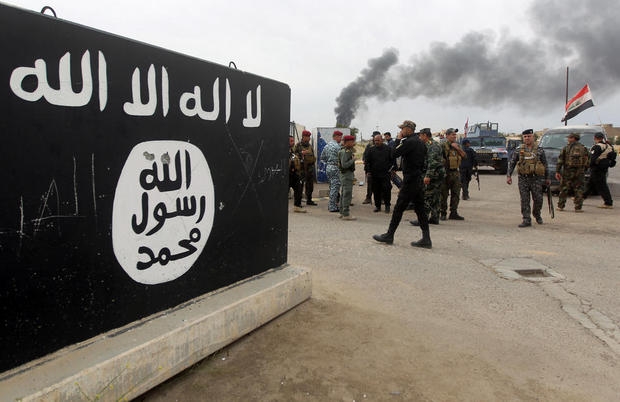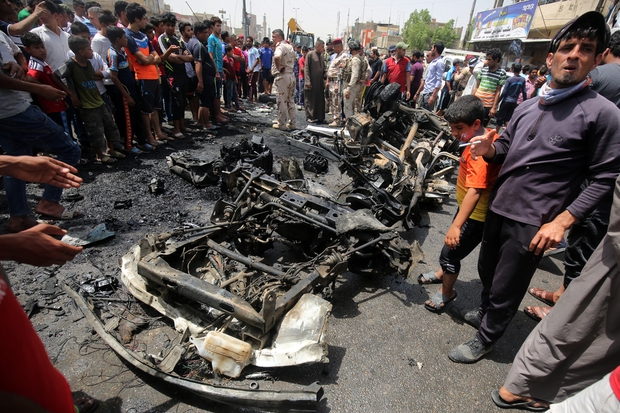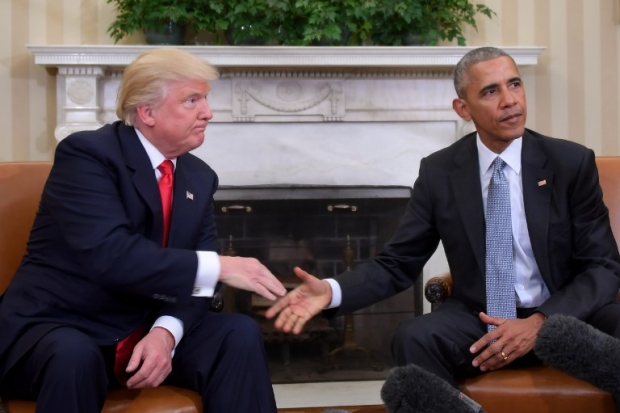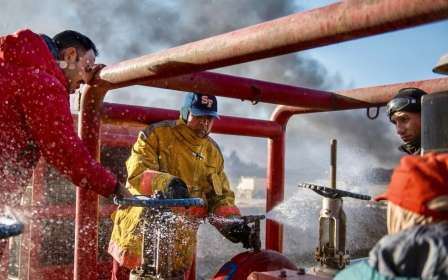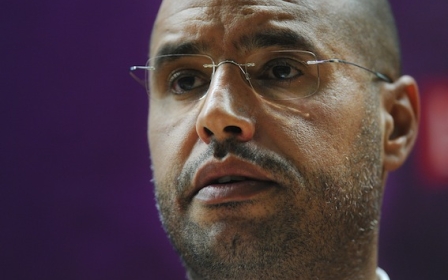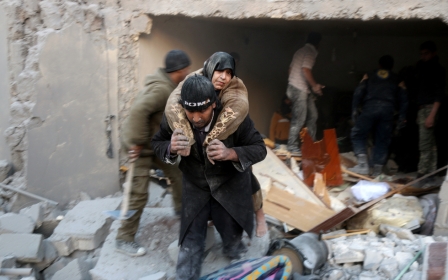As Islamic State rejoices over Trump, Obama must strike back while he still can
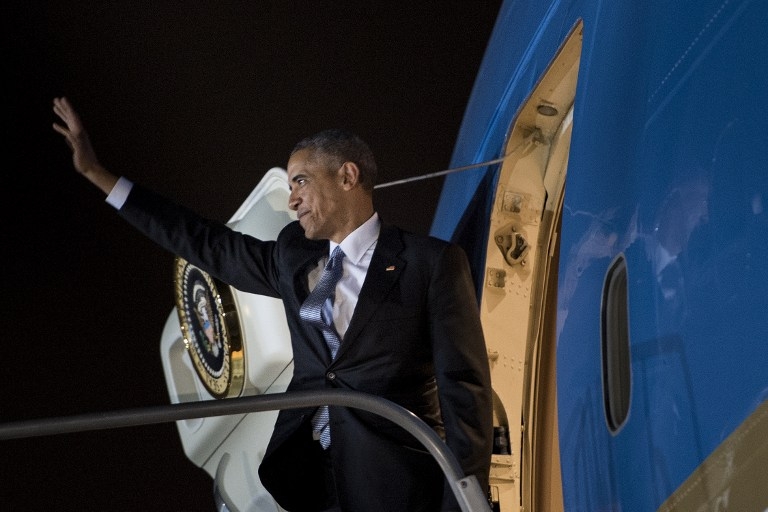
As Trump's transition team deliberates, increasingly throwing names helter-skelter from both the alt-right and the Republican establishment into the mix, it is no secret that Russian President Vladimir Putin is still rejoicing.
More surreptitiously uncorking their bottles of champagne are his Middle Eastern allies: the repressive anti-democratic, anti-Islamist leaders Syrian President Bashar al-Assad, Egyptian President Abdel Fattah al-Sisi, and Libya’s would-be strongman Field Marshal Khalifa Haftar.
READ: What will Trump do the day after his 9/11?
Paradoxically, even more jubilant at Trump’s victory, and current lurch towards the alt-right fringe, are all these leaders’ fiercest opponents: the core leadership of the Islamic State (IS) group.
Upended calculus
Just last month, IS was contemplating the imminent loss of its main territorial centres. IS recruitment has been down in 2016 relative to 2015. Its worldwide territorial control has been more than halved. Its very brutality has backfired.
Just last month, IS was contemplating the imminent loss of its main territorial centres
Since 9 November, they are now reveling in their unexpected good tidings, just as Frederick the Great did in 1762 when he learned of the death of his most stalwart adversary, Tsarina Elizabeth of Russia. Her passing presaged significant change and upheaval in Russia, enough to save Prussian forces from gradual encirclement and annihilation.
From the perspective of IS’s caliph, Abu Bakr al-Baghdadi, Hillary Clinton’s election would have represented his group’s continuing encirclement as a result of the continuation of the slow but steady progress that the Obama administration has made with its regional partners in reclaiming IS-held territory.
The continuation of the current coalition’s strategy would have meant that IS’s territorial control of any part of Mosul, Raqqa and Sirte would end, forcing its fighters to return to the stateless model of al-Qaeda-like jihadi groups.
That calculus is now upended.
Recruitment boons, propaganda wins
Although Trump has talked big about his plans to defeat IS, and may indeed have the courage and gumption to enact dynamic new plans, his campaign rhetoric and policy pronouncements are possibly inadvertently weakening the two key pillars of the current anti-IS strategy.
Even if his administration develops an excellent approach to obliterate IS in 2017, merely changing horses midstream will bolster IS’s attempts to regroup.
Degrade and destroy worked
The drivers of progress against IS have been twofold: sapping its recruitment and working with our regional allies such as the Iraqi government and its specialised counter-terror forces, the Libyan Government of National Accord and its allied Misratan militias, and the Kurdish regional government and its Peshmerga forces.
If pursued consistently over the next two years, 'degrade and destroy' would comprehensively eradicate IS’s territorial presence and largely confine the group to the dustbin of history
Coordinating with these forces, while largely ignoring the intractable political cleavages in these societies, Obama has employed the “degrade and destroy” doctrine for American engagement. It is an anti-interventionist, fearful of American casualties, light-footprint way of intervening.
It entails a narrow and gradual counter-terror approach of progressively killing high-level commanders through air strikes without engaging in any peacebuilding or capacity-building activities at the political echelon.
READ: Barack Obama's legacy: Warrior in the shadows
I have been a vocal opponent of this approach as it simultaneously ignores the urgency of the threat while attacking the symptoms of societal implosion rather than dealing with the root causes.
Despite my dogged opposition, I must confess that “degrade and destroy”, if pursued consistently over the next two years, would comprehensively eradicate IS’s territorial presence and largely confine the group to the dustbin of history.
This is not to say that it would defeat global jihadism. The root causes of violent anti-Western jihadism would be left in place, but IS as a group would be forced to flee, morph and rebrand itself – its threats to Western interests vastly reduced.
Nearly extinct
In Sirte, IS began running out of funding in early 2016. As a result, it quickly lost most of its coastal territory upon being attacked in June. At present, around 200 dedicated fighters have been contained in an area of less than a square mile.
IS can only rule amidst chaos; when surrounding populations are truly united against it, it stands no chance
However, the coalition of Misratan fighters opposing IS have not been sophisticated enough to deny them the inflow of supplies, nor did Western countries implement a naval blockade. Despite poor planning and even worse execution, with the help of Western special ops and American air strikes, the Misratans have been bravely "grinding it out".
In short, IS’s territorial control in Libya is truly on the verge of extinction and even their recruitment videos have acknowledged this fact.
In Mosul, the coalition offensive has been similarly ill-coordinated, as no political agreement underwrites the tactical cooperation between the Shia militias, the Iraqi army and the Peshmerga. Similarly to the Sirte offensive, it did not begin with the closing of escape routes - allowing IS fighters to flee and regroup.
IS leadership is responding to these setbacks by preparing for a guerilla struggle in which they abandon their territorial caliphate - transitioning into al-Qaeda-like cell structures. Against these soon-to-be-dispersed combatants, the coalition forces would initially be caught off guard, but eventually develop the tools to prevail - so long as Muslim opinion doesn’t shift and the coalition doesn’t collapse.
IS can only rule amid chaos; when surrounding populations are truly united against it, it stands no chance.
Wrench in the works
After 8 November, IS has a new lease of life. In jihadi eyes, Donald Trump is the perfect caricature of the West’s amoral decadence. He is already being vilified at a personal level more than Netanyahu or George W Bush ever were. To the jihadis, Trump is a xenophobic, godless serial adulterer who launched his business career using leveraged debt to forge a casino empire (both lending on credit and gambling are forbidden in Islam).
Young disaffected European Muslims can be expected to express their solidarity by flocking to IS strongholds to express their preference for Islamic values over those of a Western world led by a paradigmatic infidel
It matters not if Trump now pivots from the campaign towards an embrace of more tolerant views of Muslims as individuals and Islam as a civilisation. The damage is done and appointments of controversial figures such as General Flynn create a confrontational optic between the Trump administration and the Islamic world.
Young disaffected European Muslims can be expected to express their solidarity by flocking to IS strongholds to express their preference for Islamic values over those of a Western world led by a paradigmatic infidel such as Trump. Talented Syrians and Libyans who he expressly talked of banning from entering the US for either graduate study or as asylum seekers may well join them.
Buoyed by this newfound manpower and motivation, IS is likely to flex its muscles.
Even more frightening than renewed attacks is the likely collapse of the precarious anti-IS military coalition. The Iraqi and Libyan premiers currently face significant flak for working with US special ops and calling in US air strikes to retake territory.
The rise of a new anti-Americanism is all the more likely given the massive unpopularity of Russia with Sunnis in the Near East and with the religiously inclined portions of the population in Libya and Egypt. Russia aids and emboldens the anti-Islamist strongmen who actively repress these populations.
Until now, the US has attempted to approximate a neutral mediator. But no longer. With the prospect of a US-Russian detente on the cards, these groups are likely to feel they’ve been sold down the river. Why would they then lend a finger in helping us defeat IS?
Obama’s hurry-up offense
Now Obama must predict what kind of a commander-in-chief Trump will be. This is no simple task.
Trump has said that he will “bomb ISIS bigly”, yet has also shown strong isolationist inclinations. Trump himself may not know what approach he will choose to take as his pronouncements on the campaign trail and his actual governance agenda are likely to differ. His choice of advisers over the next week will likely be key in signalling which direction he will take.
The mentioning of neocons and renegades for top cabinet posts such as John Bolton, Mike Flynn or Rudy Giuliani would seem to signal that isolationism will be abandoned for a more radical version of George W Bush’s aggressive stance in confronting perceived adversaries.
READ: The John Bolton threat to Trump's Middle East policy
And yet it is possible that Trump, his national security adviser and his secretary of state would have fundamental policy disagreements, leading to muddle or vacillation. It might lead to mutual contradictory policies such as virulent opposition to Iran and the Iran nuclear deal, while simultaneously endeavoring to embrace Russia, Iran’s patron.
Given the layers of uncertainty, Obama must admit to his commanders and our international allies that his present strategy can no longer succeed given the uncertainty surrounding its indefinite continuation into the new administration and therefore its new horizon constraints.
Obama’s instinct may be to scale back this final push against IS’s capital cities, figuring it would be best to let Trump sort it out however he sees fit. After all Obama’s preference has always been for less intervention. Yet if he wishes to take out IS, a bold approach is now called for.
The great unknown
If he chooses to double down, Obama must commit significant political capital to incentivising comprehensive political compromises between the different militia components of the anti-IS coalitions in Libya and Iraq. He must also ramp up our special forces commitments and risk significant American battlefield casualties to get the job done.
Just retaking key cities won’t be enough; IS has to be eradicated to be defeated. This means the un-PC step of killing all of its top leadership and decimating its rank and file
Just retaking key cities won’t be enough; IS has to be eradicated to be defeated. This means the un-PC step of killing all of its top leadership and decimating its rank and file. This was a tall order for a presumptive Clinton White House in 2017, and now it must be accomplished in Obama’s remaining two months or left to a very uncertain future.
What looked like it would be a nine-inning game has all of a sudden been rain delayed into a single inning - that obviously changes your hitting strategy.
Obama should entertain unconventional options: the deployment of Muslim-American ground troops, technical, political and monetary support for neutral Sunni allies such as Pakistan and Morocco to enter the fray and volunteer brigades of Muslim forces commanded by Western special ops.
Should the coalition fail to completely retake Sirte and Mosul and eradicate IS’s senior leadership by Inauguration Day, there is no way to know if President Trump will remain true to his America-first isolationism or conversely if he will embark on a massive bombing campaign uncoordinated with our regional allies. Either extreme would facilitate IS becoming a semi-permanent feature of the international order.
Yet doom and gloom need not be the only outcome. It remains possible, depending on who is appointed during the transition and how they and Trump coalesce on a defined programme, that the incoming administration will actually pursue a policy that is partially a continuation of Obama’s but with various improvements in effectiveness couched with triumphalist media optics.
But no matter how much covert intelligence Obama has about VP-elect Mike Pence’s transition team, he cannot be certain of how they will actually govern. It would behoove Obama to change tack to account for the great unknown that lies ahead.
- Jason Pack is the founder of EyeOnISISinLibya.com, president of Libya-Analysis, and the North Africa analyst at Risk Intelligence.
The views expressed in this article belong to the author and do not necessarily reflect the editorial policy of Middle East Eye.
Photo: US President Barack Obama boards Air Force One at Jorge Chavez International Airport on 20 November in Lima, Peru (AFP)
New MEE newsletter: Jerusalem Dispatch
Sign up to get the latest insights and analysis on Israel-Palestine, alongside Turkey Unpacked and other MEE newsletters
Middle East Eye delivers independent and unrivalled coverage and analysis of the Middle East, North Africa and beyond. To learn more about republishing this content and the associated fees, please fill out this form. More about MEE can be found here.



